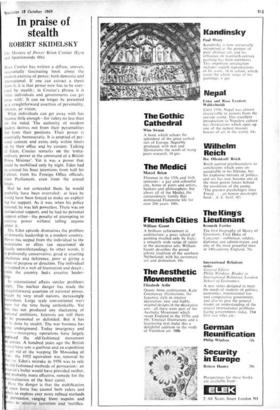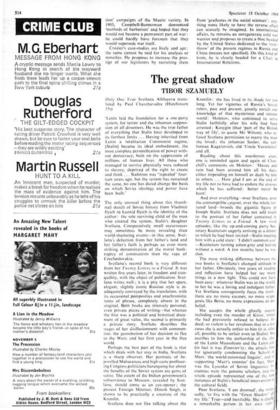In praise of stealth
ROBERT SKIDELSKY
The Masters of Power Brian Crozier (Eyre and Spottiswoode 60s) Brian Crozier has written a diffuse, uneven, occasionally fascinating book about the modern exercise of power, both domestic and International. If one can extract a thesis from it, it is that power now has to be exer- cised by stealth ; in Crozier's phrase it is
hat individuals and governments can get away with'. It can no longer be presented as a straightforward assertion of personality, interest, or vision.
What individuals can get away with has become little enough—for rulers no less than for the ruled. The authority of modern leaders derives not from their personalities but from their positions. Their power is essentially bureaucratic. It is emptied of per- sonal content and exists only within limits set by their office and by custom. Talking of Eden, Crozier remarks on the `extra= ordinary power at the command of a British Prime Minister'. Yet it was a power that could be mobilised only by night. Eden had to conceal his Suez intentions from half his Cabinet, from his Foreign Office officials, from Parliament, even from the armed forces.
Had he not concealed them, he would probably have been overruled: at least he would have been forced to make an explicit bid for support. As it was, when his policy faltered, he was left powerless. There was no institutional support, and he had no personal support either—the penalty of attempting to exercise power without telling anyone about it.
The Eden episode dramatises the problem of domestic leadership in a modern country. Power has seeped from the individual to the institutions or elites (an occasional de Gaulle notwithstanding). In other words, it Is profoundly conservative, good at exacting obedience and deference, poor at giving a sense of purpose or direction. The individual is trapped in a web of frustration and deceit ;
tile the country lacks creative leader- hip.
In international affairs similar problems PI*. The nuclear danger has made the traightforward assertion of national power, xcept by very small nations, increasingly azardous. Large scale conventional wars eem for the time being unthinkable. Yet his has not produced any slackening of ational ambitions. Interests are still there
o be promoted or defended. But it has
o he done by stealth. The war business has )ne underground. Today insurgency and il.nier-instirgency operations have largely placed the old-fashioned movement f armies. A hundred years ago the British rind have sent a gunboat and an expedition 0 get rid of the weeping Dr Mossadeq of ran: the 1952 equivalent was removal by he tin. Eden's mistake in 1956 was to rely n old-fashioned methods of persuasion : an ssassin's bullet would have provided swifter, nd probably more effective, remedy for the ationalisation of the Suez canal.
Here the danger is that the stultification f open force has caused both rulers and bets to explore ever more refined methods f persuasion ranging from napalm and rms to selective terrorism and `rectifica-
tion' campaigns of the Maoist variety. In 1903, Campbell-Bannerman denounced 'methods of barbarism' and hoped that they would not become a permanent part of war : he could hardly have foreseen - that they would supersede war itself.
Crozier's case-studies are lively and apt: the same cannot be said for his analysis or remedies. He proposes to increase the pres- tige of oUr legislators by recruiting them
from 'graduates in the social sciences': any- thing more likely to have the reverse effect can scarcely be imagined. In international affairs, he remains an unregenerate cold war warrior and proposes to create a bloc headed by the United States dedicated to the 'over- throw' of the present regimes in Russia and China (means not specified). On this kind of form, he is clearly headed for a Chair in International Relations.



































 Previous page
Previous page